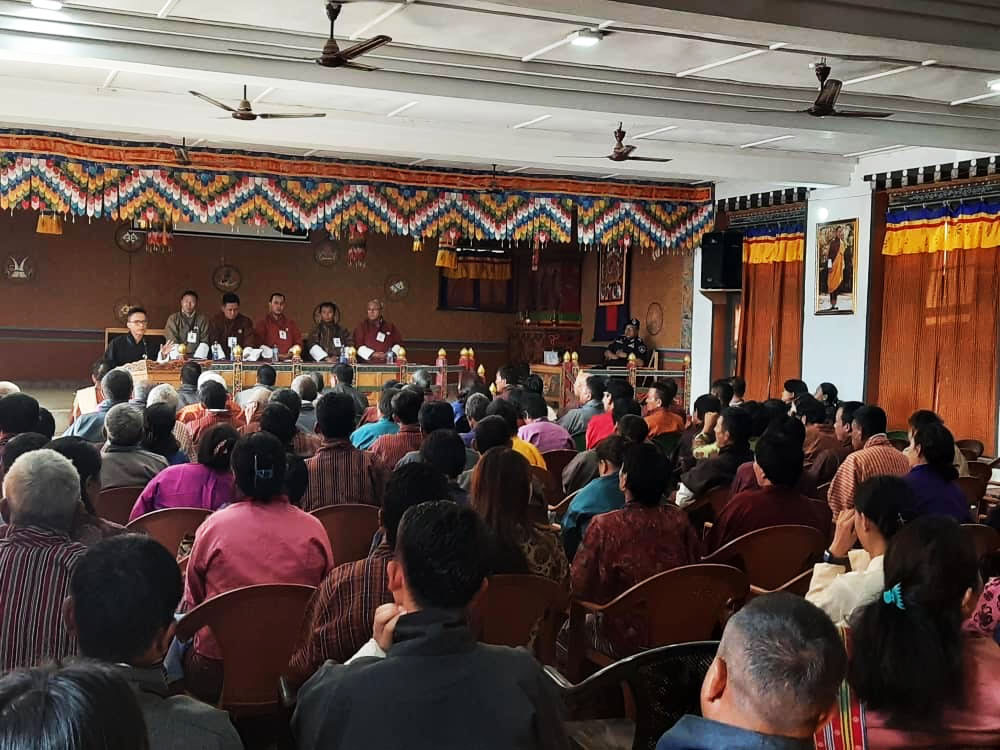Chencho Dema
Punakha – The first common forum at Barp gewog centre, home to more than 2,811 residents, for the Kabji-Talo constituency saw only around 80 people attend.
The second forum was held at three different locations in Goenshari, which has 1,022 residents and had less than a hundred attended the meeting.
With 4,365 residents, Kabisa gewog has the largest population of all gewogs in the dzongkhag. However, around 400 people attended the meeting. The poor turnout, in some places less than 10 percent, was observed in most of the common forum meetings.
The situation was not different in the neighbouring Lingmukha-Toedwang constituency to date.
Most farmers in Punakha are busy working in the fields as it is the paddy harvest season, resulting in fewer people attending the common forums for the fourth National Assembly elections.
Farmers across the country harvest paddy between September and late October.
An election official said that while the attendance figures are discouraging, they haven’t received a formal complaint about the poor turnout from any of the candidates.
Some residents said that it has been challenging for them to attend the meetings because of the ongoing harvest season. Others said that the meeting location was far from their homes.
A 52-year-old man from Chimipang said, “With no one at home and the distance of the common forum far from my place I could not go to the meeting.”
Mixed reactions
BTP’s Lingbukha-Toedwang candidate Gyambo Sithey said that the low attendance of 5-7% of registered voters at the common forum means that political parties miss the chance to present themselves to a large portion of the electorate.
Dr Tandi Dorji of DNT said, “Common forums should be done at chiwog level to give all voters a chance to participate. At the gewog level, some chiwogs are too far.”
He said that a smaller number of voters attending common forums has an impact on votes if voters don’t hear what parties are saying.
Tshering Dorji of BTP, who represents the Kabji-Talo, said that given the timing the turnout was all that bad. “The turnout would have been better had it not coincided with harvest season.”
Sangay Phurba of DPT said, “Most people are preoccupied in the field. However, I have had satisfactory attendance during my small meetings in chiwogs.”
Kinzang Thinley of DTT said, “It’s a graver matter of people losing faith in politicians and the whole process. People have also developed fatigue for elections from NC to now attending forums of five political parties.”
Further, he said that the voters feel it’s more interesting watching candidate debates where pledges are spelt out better than attending common forums.
Namgyal Dorji of PDP said that even if the candidates can’t meet everyone at the zomdu, parties are given the opportunity to conduct smaller meetings during the day in between common forums.
“So, I try to meet those who couldn’t attend the common forum through smaller meetings as permissible,” he said.
Tshencho Wangdi of DNT said, “The impact on the votes due to the poor turnout will not really matter. People are well aware and need not necessarily be introduced to any political parties.”
Kabji-Talo constituency has a total of about 13,731 registered voters. While there are 2350 postal voters (In-country), of which 1191 are male and 1159 are female. There are 70 postal voters (overseas) and 17 polling stations.
Lingbukha-Toedwang constituency has 7,807 registered voters of which 3,815 are male and 3,992 are female. It has 1,735 postal voters excluding from overseas 29. There are 10 polling stations.
According to the record compiled with the Punakha census department, the dzongkhag has a total of 33,049 residents.


